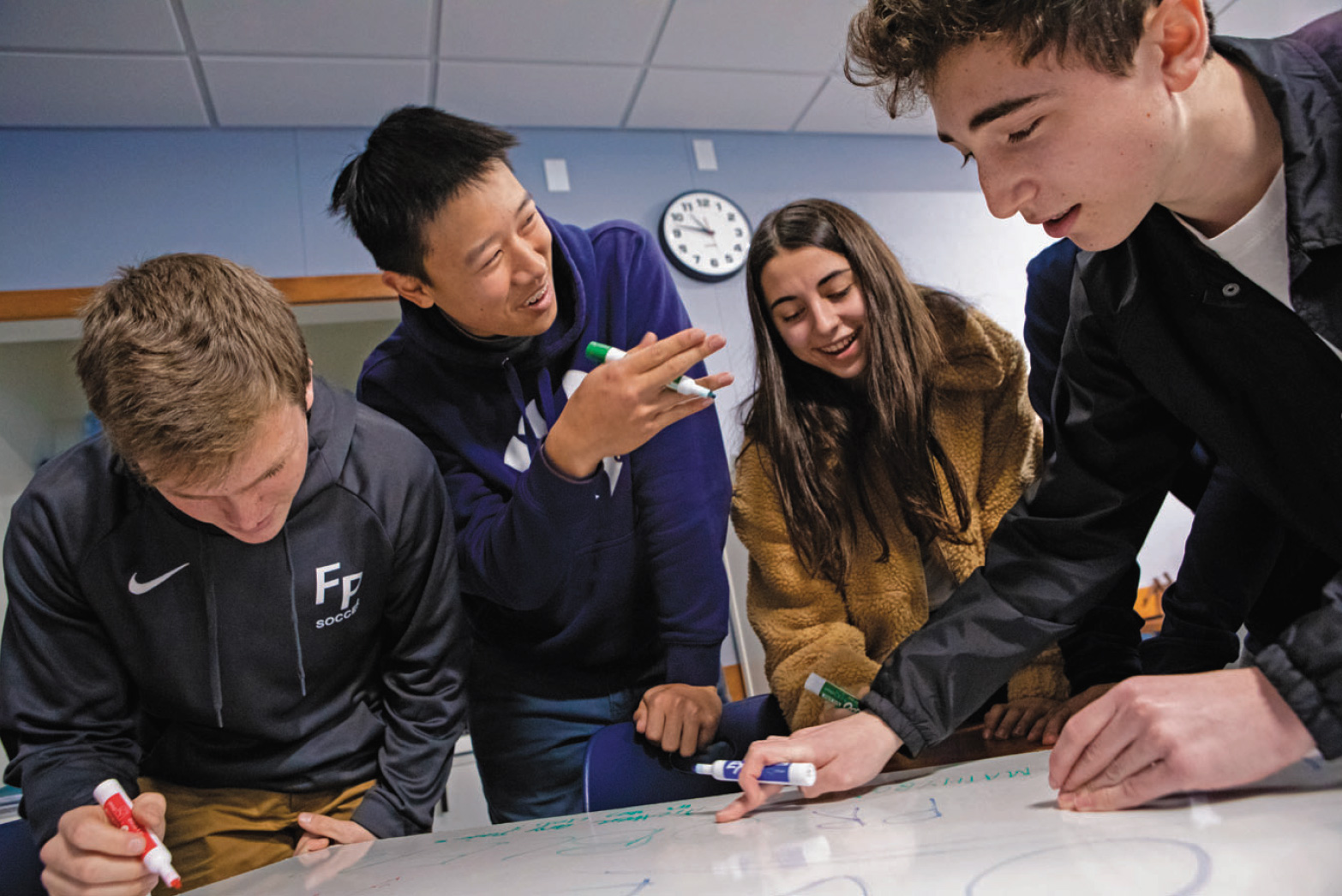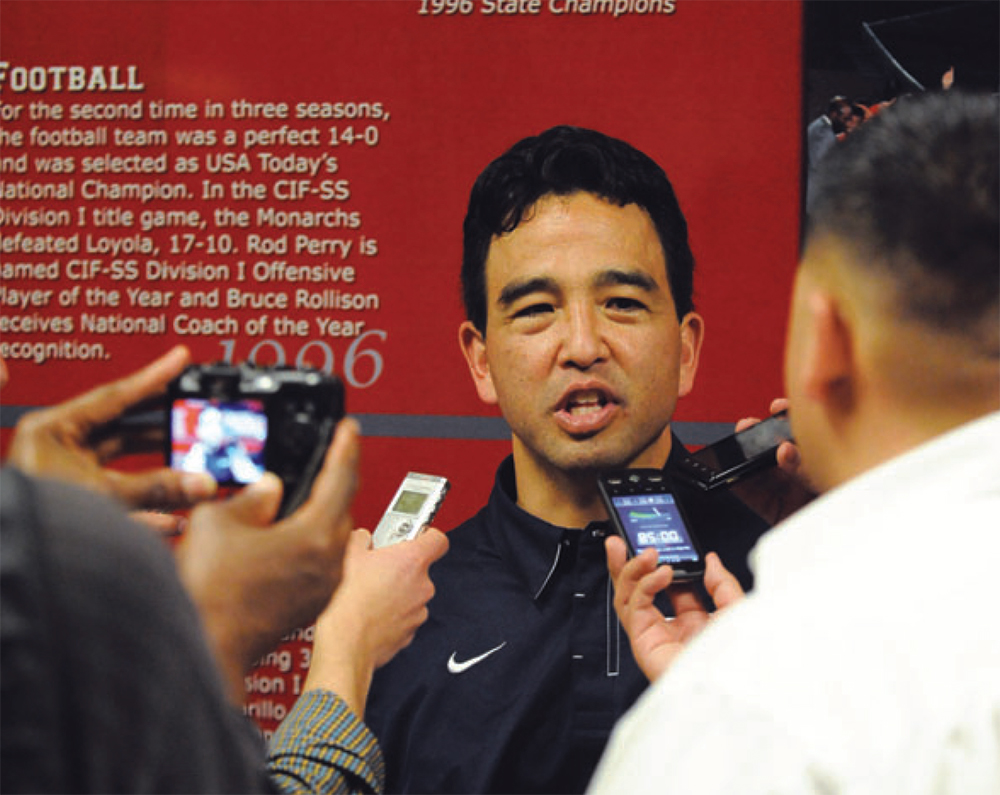Shaping Prep Life Through Honesty, Kindness, Generosity and Respect
by Mel Malmberg
“My responsibility as a student, teacher or parent in the Flintridge Prep community is to be honest, kind, generous and respectful,” reads the Prep Honor Code. Signed by students and faculty at the first Morning Meeting of the year, the Honor Code pervades the Prep community on and off campus, and provides, according to Headmaster Peter Bachmann, “our antidote to the exploitable, arbitrary and broken systems we face. Prep’s answer is integrity and perspective.”
As Bachmann wrote in a March 2019 letter to the community after the recent college admissions scandal broke, “This nation was founded in a pledge of honor. Each year, the students and adults of Prep confirm their pledge of honor in ritualized ceremony. The signers of the Declaration realized that a nation without common values is no nation. They called people capable of transcending mere selfishness virtuous. Those incapable they called corrupt.”
Bachmann continued, addressing those involved in the scandal as having demonstrated “levels of cynicism and entitlement that are value-free.
“I’ve never bought the success or integrity trade-off. I’ve seen too much success with integrity,” he emphasized. “We believe in our values—and in our kids.”
Bachmann, a historian, sees the Honor Code as part of a “trifecta” of foundational documents at the core of the school’s identity. Along with the Mission Statement and Vision Statement, Prep’s values, and Prep’s community, have been shaped by the Honor Code.

AN AUTHENTIC INCEPTION
Prep’s Honor Code arose organically, says Bachmann, as a logical outgrowth of the push for balance among ethical, emotional and academic development early in his tenure as headmaster. The school’s Vision Statement, adopted by the Board of Trustees in 1998, states, “We are committed to providing a school environment that values ethical and emotional development as equally important to intellectual development.”
In 1999, intent on codifying these essential values, Bachmann visited English classes across all grades, and asked what words described the atmosphere at Prep. “Respectful was the number one response,” he says. He did two rounds of reviews with students, one in the fall and one in the winter, tinkering with the language, and in between, he shared a draft with the Board.
“We all knew we were on to something,” Bachmann says. In the winter, the students voted in favor of the Honor Code; a vote from the faculty followed, and then it was approved by the Board.
In 2004, Katherine Thompson ’05 asked why parents didn’t sign it, and the insights from her query led to the code’s current iteration.
HONOR REVISITED: THE RISE OF THE INTERNET
Like any foundational document, the Honor Code is flexible enough to withstand challenges. In 2003-04, remembers Bachmann, the digital world was moving from nascent to ubiquitous. The confluence of anonymity and access brought forth issues like “online bullying, or just simple cattiness; we were encountering more plagiarism, from sites like Wikipedia, or published essays; we were confronted with the ease of cheating generally. So, we adjusted,” he says. Against the backdrop of an evolving world, the change arose organically—this time from a senior’s curiosity about, and passion for, Prep’s culture.
Thompson (see profile) studied the Honor Code her senior year. “I ran for Commissioner General and lost, but I still wanted to be involved with the school,” she explains. Director of Human Development Mike Roffina, with whom she was close from managing the girls cross country team, suggested that, alongside with her work on the Conduct Review Committee, she might investigate the then-five-year-old Honor Code. With the help of Bachmann and Dean of Students Midge Kimble, Thompson spent the first part of the academic year creating a series of surveys and convening focus groups, asking students about the Honor Code.
“First, we asked if they knew about it,” she says. “Then, we got at deeper questions, like, what constitutes plagiarism in your mind, how should it be addressed, and did they feel that any repercussions were equitable.” Thompson, Kimble and Bachmann found that students had a wide variety of opinions on all types of infractions, and many students felt that the case-by-case, ad hoc nature of punishment for misdeeds felt unfair and haphazard.
Thompson presented her findings to the faculty, along with a series of recommendations that were adopted and are still followed today. “That’s one of the amazing things about Prep,” she says about presenting her research, “That I was allowed to do that as a student!”
Thompson urged the faculty to discuss the mechanics and effects of plagiarism with students. She talked about the positive aspects of standardizing consequences, so students knew there was an even playing field across disciplines, activities and grade levels. Finally, she proposed ritualizing the signing of the Honor Code, and said that everyone in the community, including parents, faculty and staff, should sign it too. “We had come to realize that the Honor Code was inclusive, reciprocal and community oriented,” she explains, but it needed to be more tightly woven into the fabric of the school.
“I urged the faculty, ‘Don’t just read this and put it on a shelf. Don’t assume it’s been understood. You have to live it, and explain it, and make it a part of the culture.’”

THE HONOR CODE TODAY
Today, the Honor Code has been fully ritualized and embraced; most people on campus feel it is foundational. At the first all-school meeting, a copy is passed out to every student, faculty and staff member; Bachmann explains the Honor Code and its function; he signs his own copy, and the rest of the room follows suit. “We will hunt down anybody who missed that meeting, and ask them to sign it,” Bachmann points out. “It’s that important.” The mood in the room is serious, and Bachmann is all business when he presents; it’s a thoughtful process.
Isaac LaMarr ’19 remembers the ceremony’s importance at his first all-school meeting. “When you first begin at Prep, you want to feel a part of the community. The signing ceremony feels like the start of something,” he says.
Science Department Chair Laura Kaufman loves the tradition. “It’s wonderful to start the year with a public reminder of our shared values,” she says.
Most teachers go over the code in their initial class meetings; grade level deans talk about it with their advisees; and on class trips, Peer Counselors introduce the concept to their 7th and 9th grade counterparts. New students see the Honor Code in action as they observe and get to know older students, and absorb it as part of the school’s culture.
Teachers often include the Honor Code on exams. Math Department Chair Lesley Fox says, “I have the Honor Code at the bottom of each page of all of my tests! I don’t discuss it too much with my students, but I will bring up how I feel strongly on my part to uphold it with respect to how I run the class: homework, test calendar, no homework days, etc. In return, I expect them to uphold it too. It’s a matter of mutual respect.
“I remember when the Honor Code came into being and I still feel so proud to be at a school with an honor code. I love our Honor Code, because its simplicity is profound.”
“I put it on the syllabus and bring it up as a useful guideline when we do peer response in class, since being kind, honest, generous and respectful are great approaches to editing,” says Sarah Cooper, who teaches 8th grade history and is dean of studies.
French teacher Dr. Lauren Van Arsdall has her students translate and illustrate the Honor Code. She hangs the efforts on the wall of her classroom. “I point to these illustrations if a discussion gets out of hand,” she says. “I love that we have an Honor Code and that it’s really a part of life here.”
In athletics, the Honor Code is presented to the coaches by the athletic director (AD), says outgoing AD Garrett Ohara ’84. “We let coaches know that sports at Prep are about character development. The kids notice and emulate how you treat opponents, officials and your team. If we yell, kids think that’s okay.”
Ohara also notes that the Honor Code stays with the athletes beyond Prep. “Our graduates carry the Honor Code with them when they play at the college level, which is great.”
On teams, reinforcement comes from all the students, especially seniors and Athletic Council on Leadership members, who are primed to lead. There is automatic cooperation and sacrificing to meet goals at the team level. “I just heard about two seniors on the soccer team who went out of their way to unify the team. They told the underclassmen: ‘We’re here to serve you, we want you to play more and get better.’ That’s a prime example of the generosity we expect,” Ohara says.
Though the Honor Code permeates the Prep community, reminders are necessary, especially around big events like Prom or a tense playoff game. Inevitably, students and adults may breach the code of conduct. The student’s signed Honor Code page from the beginning of the year comes out (Kimble keeps them in her office), and a discussion ensues. When an incident is serious, a meeting in front of the Conduct Review Committee is called. But in keeping with the Honor Code itself, honesty, kindness, respect and generosity come into play as the student and Committee look to heal the infraction and move forward.

SOLID GROUND, SHIFTING SOCIETY
Plagiarism is still a pervasive issue, and bullying (and worse) has become easier, faster and more ubiquitous—and on more platforms—that it was 15 years ago. Additional pressure, which has stressed students and parents, comes from the increasingly intense college search process. Yet Bachmann says, “There is an internal robustness that helps Prep, that keeps us in line, thanks to the Honor Code.”
Director of College Counseling Gloria Díaz Ventura says, “Colleges know we are true to our Honor Code. We report infractions, which we are aware not all independent schools do, yet over the years we have built a strong reputation for Prep, and the colleges have come to value our honesty. If it is necessary to report a student infraction senior year, colleges can rescind an admission offer and we do not take that lightly.
“With the expectation of honesty oftentimes comes vulnerability. Our students are managing more stress than we know. Many students are adept code-switchers, managing one personality at Prep and one within their family.”
The Honor Code guides a student’s 15-month-long college application process, says Ventura. “Students know they are expected to be honest and respectful,” she explains, “and, if necessary, we remind them to be kind to each other, encouraging them to take care of each other, especially during the release of admission decisions. Occasionally, we have had to contact parents in the past to remind them that they also signed the Honor Code, stressing the importance of being kind to their child, and us, and to other parents. The Class of 2019 has been one of the best of my career, because the majority of parents and students remained true to our process and our values.”
Brooke Yoshino, associate director of college counseling, says, “To identify the ways in which the Honor Code can be measured, one must examine the ways in which our students interact with others in the most stressful times.”
But there are external influences impacting Prep students, Ventura and Yoshino agree. “So many outside forces overshadow the value of honesty and integrity. Yet it is the values of the family that influence a student most. The college counselor is not there at a student’s home when they hit ‘send’ on an application,” says Ventura. “We are placing our trust in every student.”
A SOPHISTICATED COMPACT
Bachmann has a thoughtful, Great Books-style philosophy about the Honor Code at Prep. “Yes, you must sign it,” he says. “But that really means, ‘I understand it.’ You have to sign it, even if you don’t agree with it. You can agree to disagree with our Honor Code, but you must abide by it.”
Developmentally, many 7th graders are “prudential”—they see a rule, and they don’t want to cross that line. They may not believe in the rule, but they believe in the punishment if they break it. By the 11th and 12th grades, most everyone has internalized the values sincerely. A minority stay prudential, and Bachmann says that works too. Students are free to disagree and debate.
“We love being questioned about it,” says Bachmann. “We don’t want humorless kids, we want them to think about it, to maybe wrestle with it. We sometimes talk about absolute versus relative values. These are not four values forever, for your whole life—just what Prep agrees on. But we do agree, and we uphold these values.
“We have a saying here called ‘kind candor.’ We try to be candid; we encourage our kids to be candid. And they know we stand by that, and by the Honor Code, on every occasion. If teachers or coaches have poor student evaluations, we write them up. If Gloria Ventura needs to have a conversation with a college, she will.
“The reciprocity is paramount,” Bachmann adds. “Students call us to account as teachers. If we are too assertive in the classroom, if we favor a student, they ask: ‘Are you respecting us as students?’ If I get out of line, my students definitely call me on it. And they are pleased to see the Honor Code at work.”
PREP (AND THE HONOR CODE) FOR LIFE
The Honor Code is a community builder, a bulwark, a guide, a foundation, a basic part of Prep for Life. Breaches of the Honor Code are the exception, says Bachmann, “but we also know the Honor Code is aspirational. We are in an age of anxiety. We can step in with counseling, if it’s appropriate. We involve parents, talk about what outside stresses are causing behaviors. We are compassionate.”
Prep’s Honor Code is, ultimately, more conscience driven than consequence driven, preparing students for, as the Mission Statement reads, “an engaged, balanced and responsible life.”
“I truly believe honesty is not for suckers,” says Bachmann. “If your ethics are prudential, unconsidered, eventually the world will catch up to you; the world will catch on.
“Community values that genuinely arise out of community are worth honoring, worth preserving. But take from Prep what you want, what speaks to you.
“That’s why I avoid using the word graduation and use Commencement instead. It’s a beginning,” Bachmann explains. “How will you apply what you’ve learned?”
On the next-to-last day of school, just before his own Commencement, Isaac LaMarr reflected on his years at Prep, his next steps and the respect that students and faculty feel for one another 20 years after the Honor Code was put into place. “The Honor Code is unspoken. We don’t recite it every day, but we live it. It’s the way we live here. It’s what makes us all belong.”




